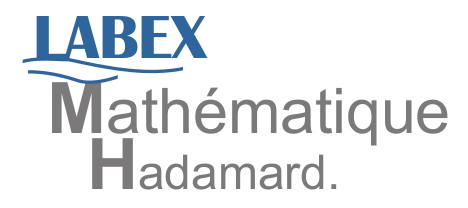|
5 videos available for this event!
|
|
MULTIYEAR PROGRAM
HYBRID RESEARCH SCHOOL / ECOLE DE RECHERCHE ALEA Days |
Groupe de travail du GDR-IM
|
|
Scientific Committee
Comité scientifique Marie Albenque (CNRS – École Polytechnique) |
Organizing Committee
Comité d’organisation Jérémie Bouttier (CEA Saclay) |
|
The annual meeting Aléa is dedicated to the study of random discrete structures arising in various scientific domains, mainly in theoretical computer science, combinatorics and probability theory, but also in statistical physics, bioinformatics or in other branches of mathematics.
These structures are, for example, trees, words, permutations, lattice walks, more geometrical objects like planar maps, or other objects related to discrete dynamics like cellular automata. Aims and methods are diverse, ranging from enumeration, asymptotic properties and analytic combinatorics, probability, random generation… The Aléa meeting is closely related to the community of the Working Group Aléa of the “Groupement de recherche CNRS” gdr-im, which was created in the 90’s under the impulse of Philippe Flajolet to promote interactions between combinatorics and probability around the analysis of algorithms. In the last ten years it has been the birth place to many fruitful interdisciplinary collaborations (e.g. on planar maps, walks in quarter plane, algebraic urns…) and it has grown into one of the most active interface between computer scientists and mathematicians in France. The program of the conference aims both at broadening the common knowledge of the participants via mini-courses and invited long talks, and at reflecting the variety and dynamism of the community via short talks that are selected through an open call. |
Les journées Aléa sont consacrées à l’étude de l’aléa discret, i.e. l’étude des structures aléatoires discrètes telles qu’elles apparaissent dans diverses disciplines, principalement l’informatique théorique, la combinatoire et la théorie des probabilités, mais aussi la physique statistique, la bio-informatique ou d’autres branches des mathématiques.
Les objets d’études sont par exemple les arbres, les mots, les permutations, les chemins, ou des objets plus géométriques comme les cartes, ou encore liés à une dynamique discrète comme les automates cellulaires. Les objectifs et les méthodes utilisées sont divers : l’énumération, les propriétés asymptotiques et la combinatoire analytique, les propriétés probabilistes, la génération aléatoire… Les journées Aléa sont étroitement liées à la communauté du groupe de travail Aléa du gdr-im, créé à l’initiative de Philippe Flajolet vers la fin des années 90 pour favoriser les interactions entre combinatoristes et probabilistes autour de l’analyse d’algorithmes. Au cours de ces dix dernières années, elles ont été le creuset de nombreuses et fécondes collaborations interdisciplinaires (e.g. autour des cartes planaires, des marches dans le quart-de plan, des urnes algébriques…) et elles sont devenues lieu d’expression de l’une des interfaces math/info les plus actives en France. Le programme répond au double objectif d’assurer une forme de formation continue de la communauté au travers de cours invités et d’exposés longs, et de refléter sa diversité et son dynamisme au travers d’exposés courts sélectionnés via appel à propositions. |
Mathilde Bouvel (CNRS – LORIA Nancy) Arbres de génération : une méthode pour l’énumération et les limites locales
Stephen Melczer (University of Waterloo) Multivariate asymptotics
Christina Goldschmidt (University of Oxford) Introduction aux modèles de graphes aléatoires
Boris Adamczewski (CNRS – ICJ Lyon) Aléa, automates et transcendance
Nathalie Aubrun (CNRS – LISN Saclay) Pavages et dynamique symbolique
Andrew Elvey Price (CNRS – IDP Tours) Elliptic function approach to counting confined lattice walks with small steps
Matthieu Lerasle (CNRS – CREST Palaiseau) Calendriers et problèmes d’appariement
Raphaël Rossignol (Institut Fourier, Université Grenoble-Alpes) Percolation dynamique
Etienne Bellin (Ecole Polytechnique) Independence number of large random trees
Nadia Belmabrouk (Université Paris Est Créteil) Processus de Hawkes sur un réseau à longues portées
Dan Betea (Université d’Angers) From Gumbel to Tracy–Widom via random (ordinary, plane, and cylindric plane) partitions
Valentin Bonzom (Université Sorbonne Paris Nord) Énumération de cartes non orientées via l’intégrabilité
Jordi Castellví Foguet (Polytechnic University of Catalonia) Enumeration of chordal planar graphs and maps
Philippe Chassaing (Université de Lorraine) Champs de vecteurs et triangles combinatoires
Linxiao Chen (ETH Zürich) A transfer theorem for Δ-analytic functions in several variables
Yi-Ting Chen (Sorbonne Université) A spectral property for concurrent systems and some probabilistic applications
Héloïse Constantin (ENS Lyon) Mesures sur les forêts couvrantes d’unicycles
Sylvie Corteel (CNRS Université de Paris) k-pavages de l’hexagone
Elie de Panafieu (Bell Labs France, Nokia) Algorithmes de partitionnement par comparaisons de paires
Léo Dort (ENS Lyon) Limite locale du graphe de Erdős–Rényi dynamique
Raphael Ducatez (Université de Genève) Large deviation estimate for the largest eigenvalue of a random matrix
Eva Hainzl (TU Wien) Singularity analysis of solutions to functional equations with catalytic variable
Corentin Henriet (Université de Paris) Poissons combattants, marches dans le quadrant et cartes planaires
Lyuben Lichev (ENS Lyon) Percolation on dense random graphs with given degrees
Cyril Marzouk (Ecole Polytechnique) Exploration et promenade sur de grandes cartes planaires aléatoires
Victor Nador (Université de Bordeaux) Scheme decomposition for maps decorated with loops
Erkan Narmanli (Ecole Polytechnique) Énumération asymptotique des orientations bipolaires et des structures transverses
Hadrien Notarantonio (INRIA Saclay) Algorithms for solving fixed point equations of order 1
Zéphyr Salvy (Université Gustave Eiffel) Cartes planaires aléatoires décomposées en blocs : étude des phases
Joonas Turunen (ENS Lyon) A new family of random planar maps with large faces mixing causal and tree structures
David Wahiche (Université Claude Bernard Lyon 1) Aléa, nouvelles propriétés de la décomposition de Littlewood et ses applications
Harriet Walsh (ENS Lyon) La mesure de Plancherel–Hurwitz : des partitions aléatoires aux cartes à grand genre














